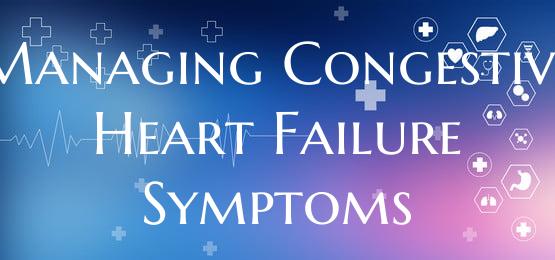
Managing Congestive Heart Failure Symptoms
Congestive heart failure (CHF) is a serious condition that requires proper management to improve a person's quality of life and reduce the risk of complications. While there is no cure for CHF, various strategies can help manage symptoms effectively. Here are some key approaches to managing congestive heart failure symptoms:
1. Medication Management: - Patients with CHF are usually prescribed medications such as ACE inhibitors, beta-blockers, diuretics, and aldosterone antagonists. It is essential to take these medications as prescribed by the healthcare provider to help control symptoms and prevent the progression of heart failure.
2. Diet and Fluid Restriction: - Following a heart-healthy diet low in sodium can help control fluid retention and reduce the workload on the heart. Patients with CHF should limit their salt intake and avoid foods high in sodium. Fluid restriction may also be necessary to prevent fluid overload.
3. Exercise: - Physical activity is essential for managing CHF symptoms. Regular exercise can improve cardiovascular fitness, strengthen the heart muscle, and enhance overall well-being. It is important to work with a healthcare provider to develop a safe and effective exercise plan tailored to individual needs.
4. Monitoring Weight and Symptoms: - Patients with CHF should monitor their weight regularly as sudden weight gain may indicate fluid retention. It is important to report any changes in weight or symptoms such as increased shortness of breath, fatigue, or swelling to a healthcare provider promptly.
5. Stress Management: - Stress can exacerbate CHF symptoms and lead to complications. Techniques such as deep breathing, meditation, mindfulness, and relaxation exercises can help manage stress and improve heart health.
6. Quit Smoking: - Smoking is detrimental to heart health and can worsen CHF symptoms. Quitting smoking can improve cardiovascular function and overall health outcomes.
7. Regular Medical Follow-Up: - Regular check-ups with a healthcare provider are crucial for monitoring the progression of CHF, adjusting treatment plans, and addressing any concerns or symptoms promptly.
It is essential for individuals with congestive heart failure to adopt a holistic approach to symptom management, incorporating medication adherence, lifestyle modifications, regular monitoring, and ongoing communication with healthcare providers. By actively participating in their care and following recommended guidelines, individuals with CHF can better manage their symptoms and improve their overall quality of life.